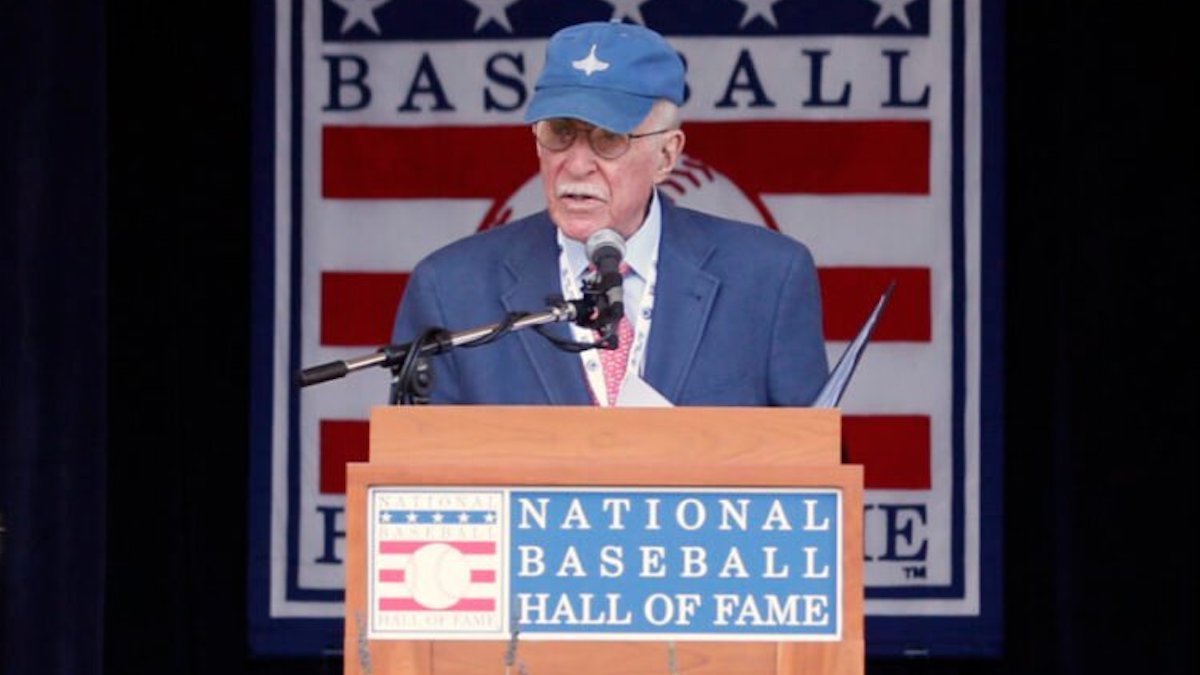An era most certainly ended with the passing of Roger Angell this past Friday (May 20). The renowned New Yorker writer was 101 years old. That is unquestionably a full life. Perhaps it’s more accurate to say that Angell’s career spanned multiple eras.
Angell watched players that most of us only read about. He saw Babe Ruth play for the New York Yankees. And he also watched Ruth’s modern-day equivalent, the reigning American League Most Valuable Player, the Los Angeles Angels’ Shohei Ohtani.
Current generations of baseball fans might be unfamiliar with Angell’s work, attaching it to a bygone era. Though his name is associated with the finest baseball writing, Angell might be perceived as out of place during a time when the focus is largely on numbers and metrics, trade rumors, star players, and the daily grind of a baseball season.
Yet his writing shouldn’t be viewed in sepia tones or grainy black and white footage. Angell winced at any descriptions of his baseball work as “poetic.” He had no use for sentimentality, saying in a 2000 Salon interview that he “hated” Field of Dreams. He didn’t traffic in nostalgia, enjoying how baseball evolved and changed throughout the years.
Angell insisted he was a reporter. Yes, he had access to major-league clubhouses and manager’s offices and was revered for his knowledge and sense of history. But he also watched the game from the stands and at home.
Long before bloggers and the likes of Bill Simmons wrote about their fandom, Angell approached baseball from that perspective as well. Angell knew what it was like to be a fan, how absurd it might seem to those who don’t invest themselves in the fortunes of their favorite team, who don’t let glorious wins and crushing losses influence their mood and emotions — or their very lives.
“What I do know is that this belonging and caring is what our games are all about; this is what we come for,” wrote Angell in his 1977 book Five Seasons.
“It is foolish and childish, on the face of it, to affiliate ourselves with anything so insignificant and patently contrived and commercially exploitative as a professional sports team. What is left out of this calculation, it seems to me, is the business of caring — caring deeply and passionately, really caring — which is a capacity or an emotion that has almost gone out of our lives.”
There may be no better description of being a sports fan ever written. Angell argues that such devotion and emotional investment make us better people.
Inspired by John Updike’s 1960 story about Ted Williams, “Hub Fans Bid Kid Adieu,” Angell lauded the players who excelled at the sport, explaining what made them special with spectacular descriptions. In his 1972 book The Summer Game, Angell detailed Willie Mays playing center field as “running so hard and so far that the ball itself seems to stop in the air and wait for him.” He compared Chase Utley’s swing in a 2009 New Yorker piece (via the NY Times‘ Tyler Kepner) to “a man in an A.T.M. reaching for his cash.”
Angell’s career didn’t begin as a baseball writer, which might be one reason why he was able to write about it with such distinction. The New Yorker was practically the family business with his mother, Katherine Sargeant, becoming the magazine’s first fiction editor. His eventual stepfather was E.B. White, author of Charlotte’s Web and Stuart Little.
After serving in the Army, Angell published his first work in 1945, a short story titled “Three Ladies in the Morning.” He was hired on the staff in 1956 and eventually became fiction editor as well, working with writers like Updike, Vladimir Nabokov, William Trevor, and Ann Beattie. He also wrote poetry for the New Yorker, authoring the magazine’s holiday poem for more than 20 years.
But Angell unquestionably loved baseball. He was so enthusiastic and descriptive of the sport that legendary New Yorker editor Wallace Shawn suggested he write about it, despite the magazine being known for literary fiction and poetry. In 1962, Shawn wanted to expand the magazine’s coverage into sports and told Angell, “Go down to spring training and see what you find.”
That 1962 season was the inaugural campaign for the expansion New York Mets, who lost more games than any team in Major League Baseball history. Those 120 losses set a record that still stands. But amid that struggle, Angell found plenty to chronicle, much to love about a team that endeared itself to fans.
“They were these terrific losers that New York took to its heart,” Angell said, via the New York Times obituary written by Dwight Garner. But Angell couldn’t restrict his admiration to only one team. He also followed the Yankees. And the Boston Red Sox. His love of baseball was so sizable that no one called him out on that.
Many of Angell’s numerous essays on baseball for the New Yorker were collected into books, including Late Innings, Season Ticket, and Once More Around the Park. He also wrote a book with David Cone, A Pitcher’s Story, that delved into the craft of pitching and the career of someone who was among the sport’s best during a 17-year career. But Angell wrote about more than baseball, including his 2006 memoir, Let Me Finish, and a 2015 collection of essays, This Old Man: All in Pieces. The title pieced earned him a National Magazine Award.
In 2014, Angell was honored with the National Baseball Hall of Fame’s J.G. Taylor Spink Award (renamed the BBWAA Career Excellence Award in 2021), recognizing “meritorious contributions to baseball writing.” (He couldn’t have received a better induction speech than Tom Verducci’s tribute to him in Sports Illustrated.) Interestingly, Angell was the first writer to earn the Spink Award who wasn’t a member of the Baseball Writers’ Association of America.
We will likely never see a writer like Angell again. He emerged during an era when literary writers, including Norman Mailer and George Plimpton, often took forays into sports like boxing and football. Sportswriting is more specialized now, typically restricted to websites and magazines devoted to sports, and the sports section of a newspaper. Writers and reporters who follow beats like politics or finance often have to write a book to cover sports. (Michael Lewis, for example. Or current New Yorker editor David Remnick.)
But we will always have Angell’s work — the words, the stories, the passion — to enjoy.
Ian Casselberry is a sports media columnist for BSM. He has previously written and edited for Awful Announcing, The Comeback, Sports Illustrated, Yahoo Sports, MLive, Bleacher Report, and SB Nation. You can find him on Twitter @iancass or reach him by email at iancass@gmail.com.







